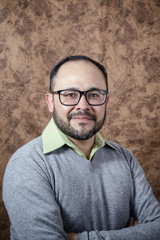Meet some of the 2024 recipients of one of Canada’s most prestigious postdoctoral awards, exemplifying world-class research capacity at an internationally competitive level of funding.
 Mary LaPierre, Neuroscience
Mary LaPierre, Neuroscience
A neural basis for the coordinated control of thermal and osmotic homeostasis
Why does salt intake lower body temperature? Why does heat exposure reduce urination? Mammals use evaporation (such as sweating or panting) to cool down, so our body temperature and hydration status are inextricably linked and must be precisely coordinated by the brain. How the brain achieves this coordination remains unknown.
Dr. Mary LaPierre’s research examines the mechanistic processes by which the brain integrates environmental signals to orchestrate homeostatic processes. As a postdoctoral fellow with Professor Charles Bourque, Mary is working to identify the “sensor” neurons that detect heat and dehydration, and how they communicate with “effector” neurons to control responses such as thermogenesis, feeding behaviour, sodium appetite, and diuresis. Acquired or inherited dysregulation of these processes underlies a wide spectrum of health conditions, from heat stroke and dehydration to hypertension and heart disease. Identifying the neural circuits controlling these processes will provide insight to optimize the treatment of such conditions.
 Jessica Quinton, Environmental Studies
Jessica Quinton, Environmental Studies
Canada is facing two major growing crises: housing affordability and climate change. Cities are, in part, attempting to address them through urban planning. Mixed-use development—which clusters together residences, workplaces, services, and amenities—is increasingly touted as a ‘win-win’ form of sustainable urban planning that can reduce travel-related carbon emissions, improve housing affordability, and increase social diversity (e.g. in household age, income, or size). However, previous urban-sustainability efforts have been criticized for emphasizing economic growth—often at the expense of ecological wellbeing and social equity. Little research has been conducted on the sustainability of mixed-use development, particularly the social aspect, so my research asks: “What are the social sustainability (i.e. housing affordability and social diversity) outcomes of mixed-use developments, and how are they shaped by the tensions between economic, ecological, and social sustainability priorities?” It will combine spatial analyses, case studies, and policy analyses to examine these questions in Canadian cities.
 Pedro Guillermo Ramon Celis, Anthropology
Pedro Guillermo Ramon Celis, Anthropology
Community-Collaborative Zapotec Archaeology: Investigating Commoner Roles in Guiengola's Late Postclassic Urban Landscape
Based in Tehuantepec, Oaxaca, Mexico, my archeological research prioritizes collaboration with the Zapotec descendant community utilizing non-invasive methods to respect their sacred landscape. The study examines the role of commoners in constructing the fortified city of Guiengola in the 14th century. It challenges the prevailing narrative of elite-centric urban planning, highlighting the influence of commoners in shaping their built environment. Through spatial analysis, including LiDAR data and architectural evidence, the study aims to provide new insights into Mesoamerican daily life on the eve of European contact.
The project directly addresses the wishes of the Zapotec descendant community to increase knowledge about their ancestors through a non-collection-based data strategy, transferring the control of the information and the interpretation of the data to a new generation of heritage partners and community members.
 Monica Shank Lauwo, Education
Monica Shank Lauwo, Education
Stories of lives and literacies: Imagining futures, identities, and decolonial educational possibilities with Tanzanian girls
Motivated by the transformative power of education and the acknowledgement that African girls are frequently ill-served by mainstream schooling, Monica’s postdoctoral research collaborates with Tanzanian girls in the imagination of decolonial educational possibilities. Employing a participatory approach that positions girls as authors, artists, and agents of change, this study engages Tanzanian girls as co-ethnographers of their own language and literacy practices. The aim is to create equitable educational spaces where girls’ languages, literacies, and identities are centred in curriculum, pedagogy, and policy.
By collaboratively generating digital multilingual resources that highlight severely under-represented languages and perspectives, this project will illuminate the rich multilingualism, literacies, and talents of girls who are often discussed with deficit framings, while contributing to language revitalization of declining Tanzanian languages. This study will provide useful insights and resources supporting the development of more equitable, decolonial, and pluralistic approaches to education, in Africa, Canada, and beyond.
 This work is licensed under a
This work is licensed under a